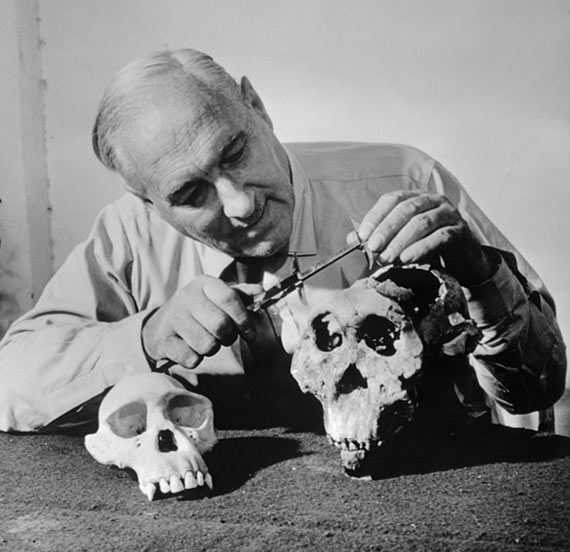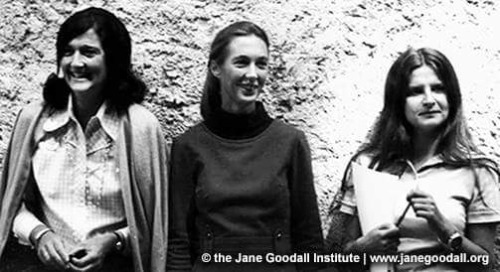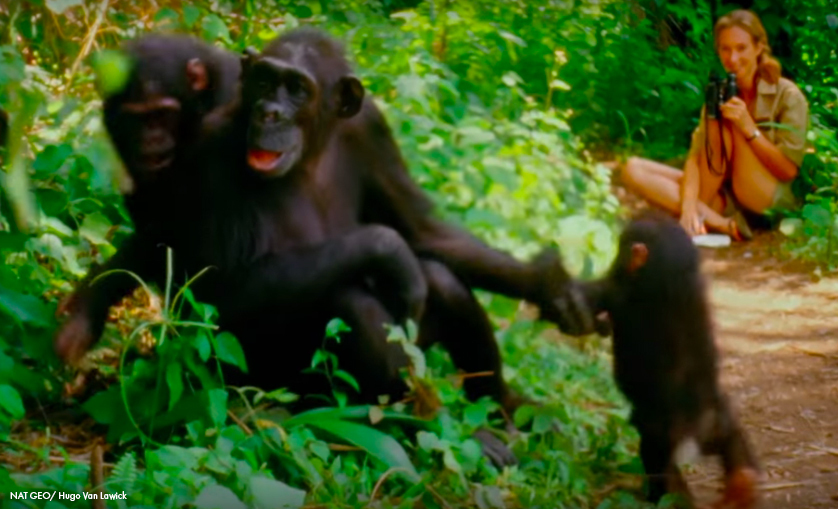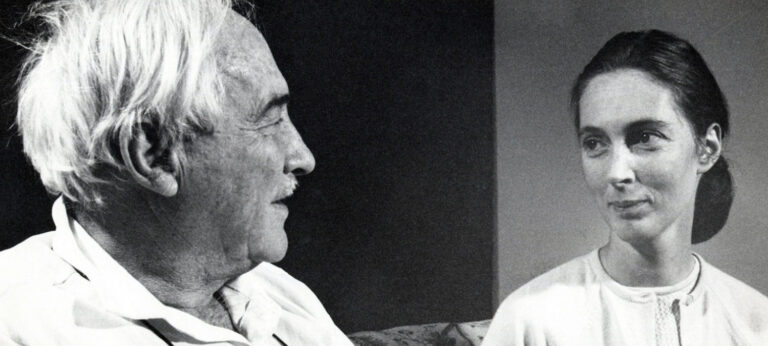Dr. Jane Goodall’s journey to Gombe nearly 60 years ago to study wild chimpanzees may seem like a simple story, but it was the result of a lot of hard work and dedication. Many details of the path Jane took to get to Gombe are often eclipsed by her groundbreaking discoveries and subsequent activism, but they paint a larger picture of determination, curiosity and the importance of mentors. Jane’s passion for wildlife was a key driver motivating her to go to Africa to study and write about them. While visiting a friend’s farm in Kenya in her early twenties with no prior experience, Jane was lucky enough to have her background in secretarial work line up serendipitously with an arrangement to meet with Dr. Louis Leakey. This is what set her on the road to discovery. But who is Louis Leakey?
Born on August 7, 1903, Leakey’s British parents were serving as missionaries in Kenya where he spent some of his childhood, enabling him to learn the Kikuyu language and Swahili fluently. Later, an unfortunate injury he experienced playing Rugby at Cambridge ended up changing the course of his life, as he decided to use his medical leave to go on an archaeological expedition in Tanganyika (which now forms part of the modern-day sovereign country of Tanzania). He switched his major to Anthropology and upon graduation he lectured and wrote about African archaeology and paleontology. Cambridge sent him to East Africa to study early human fossils, excavating many sites and delivering a systematic study of artifacts.

In the 1920s and 30s, early timelines of human evolution were not widely accepted by the general public. Working in Olduvai Gorge, Tanzania, Leakey and his wife Mary discovered pieces of the human fossil record, including our early ancestors Homo habilis, Homo erectus, and their Acheulean tools. Their research provided a new understanding of human evolution in and out of Africa, and the anatomical and behavioral traits of the world’s first hominids (family Hominidae includes humans, extant great apes and extinct early human ancestors). Through these findings, Leakey started to realize that a crucial step in understanding how our ancient ancestors lived meant learning more about the behavior of our closest living great ape relatives – chimpanzees, gorillas, and orangutans.
“People frequently ask me why I devote so much time to seeking out facts about man’s past…the past shows clearly that we all have a common origin and that our differences in race, color, and creed are only superficial.”
That is when the world of Jane Goodall and Louis Leakey collided. Dr. Leakey hired Jane as his secretary, and was impressed by her attention to detail, patience and extensive knowledge of wildlife. Leakey was looking for a fresh pair of eyes and a fiery spirit – someone who could observe things that those in the existing scientific community would not be able to. Despite having no formal degree, Leakey hired Jane to study chimpanzees in the wild.
26 year old Jane Goodall, acting as Leakey’s mentee, traveled to Tanzania in 1960 to find the chimpanzees she would research. Leakey made this possible by helping her get a grant from the Wilke Foundation. At the same time, he also hired Biruté Galdikas to study orangutans and Dian Fossey to study gorillas. They were known as the ‘Trimates’. Together, they helped unlock key insights about our great ape relatives and ourselves.

In 1960, Jane first reported chimpanzees using thin blades of grass to fish out ants between holes in the trunks of trees and dirt on the ground. Suddenly, what had been deemed a defining trait of humans – tool use and creation – was challenged. Leakey, who often faced naysayers, famously said in response, “Now we must redefine tool, redefine Man, or accept chimpanzees as humans.”

Leakey encouraged Jane to pursue her PhD in ethology at Cambridge, and to obtain funding from National Geographic. Through her legitimized research and the international reach of National Geographic, the world came to understand and accept the “human-like” social behavior and personalities chimpanzees exhibit. This set the stage for further investigation into the intelligence and emotionality of other non-human animals, and our own behavior.
These two remarkable scientists followed their instincts and supported one another at a time when very few believed in their theories or work. Through the discoveries of Dr. Leakey and Dr. Goodall, we now not only know more about how humans evolved and what behaviors we share with our early ancestors and fellow great apes, but also so much more about our place in the larger web of life on this planet.
Want to learn more about groundbreaking science and chimpanzees? Become a Gombe Science Hero today.

The Jane Goodall Institute is a global community conservation organization that advances the vision and work of Dr. Jane Goodall. By protecting chimpanzees and inspiring people to conserve the natural world we all share, we improve the lives of people, animals and the environment. Everything is connected—everyone can make a difference.






